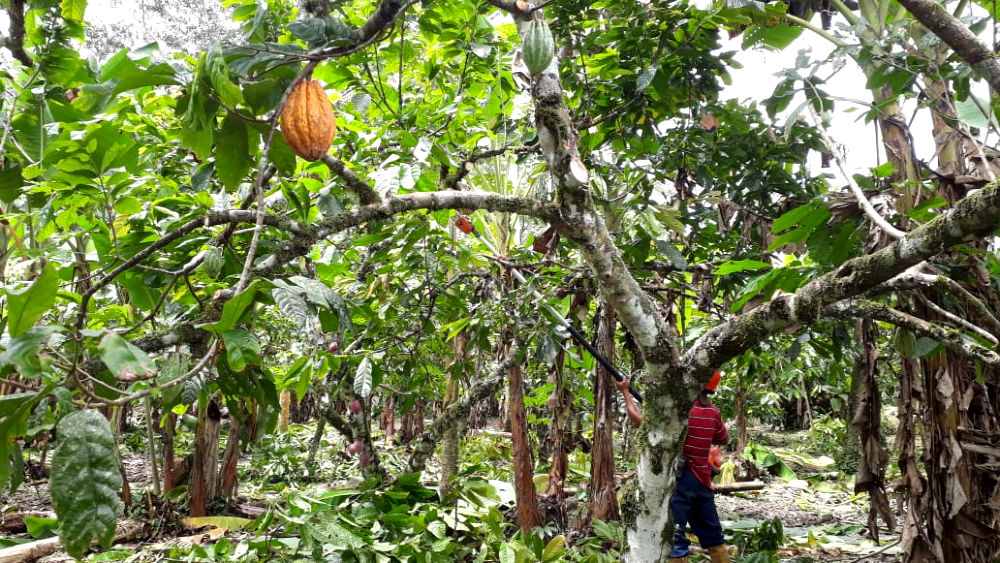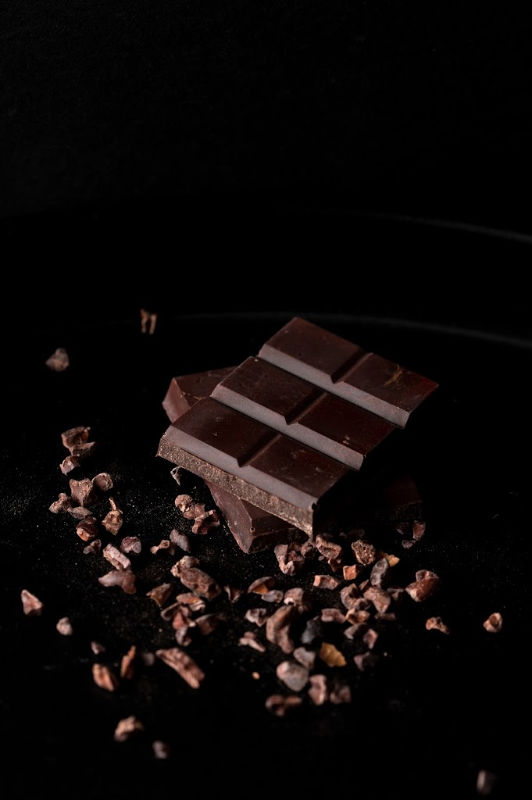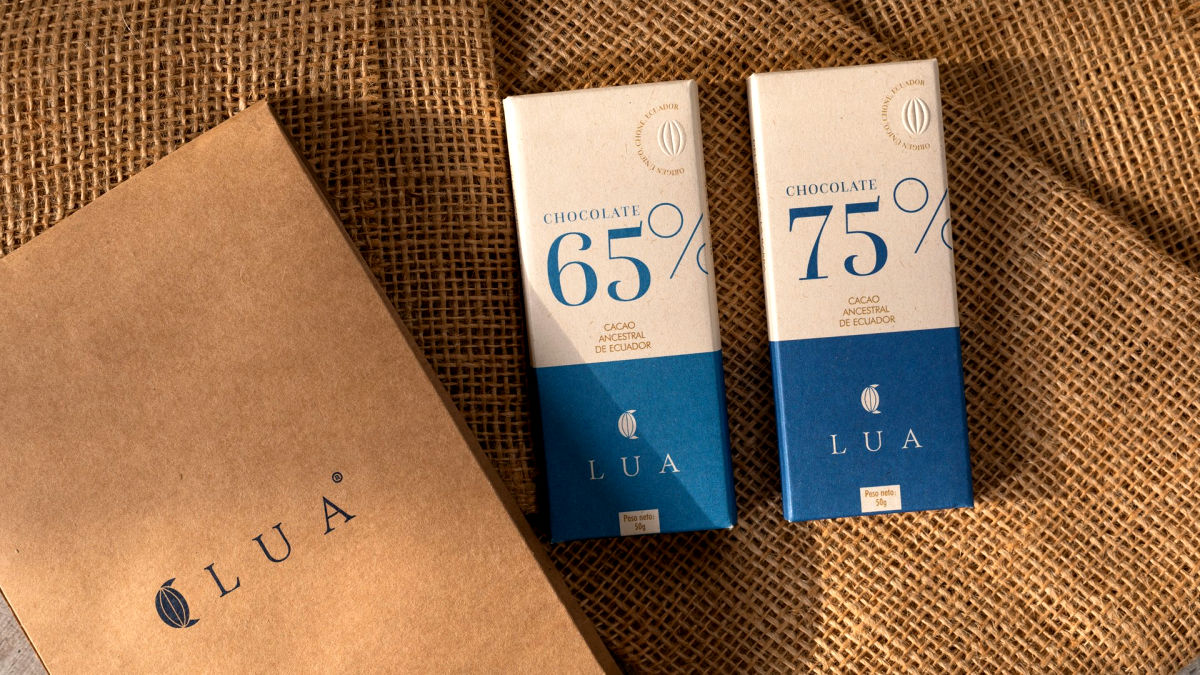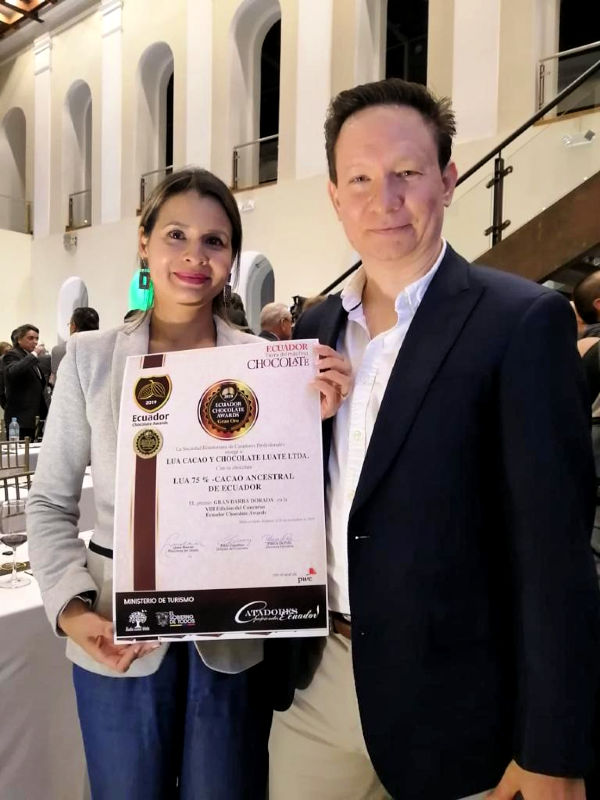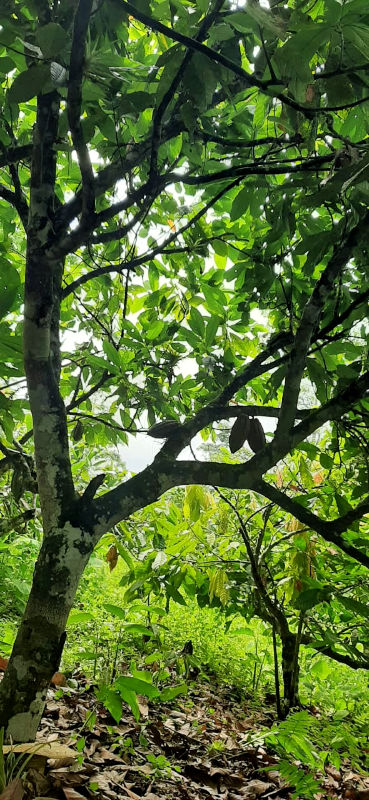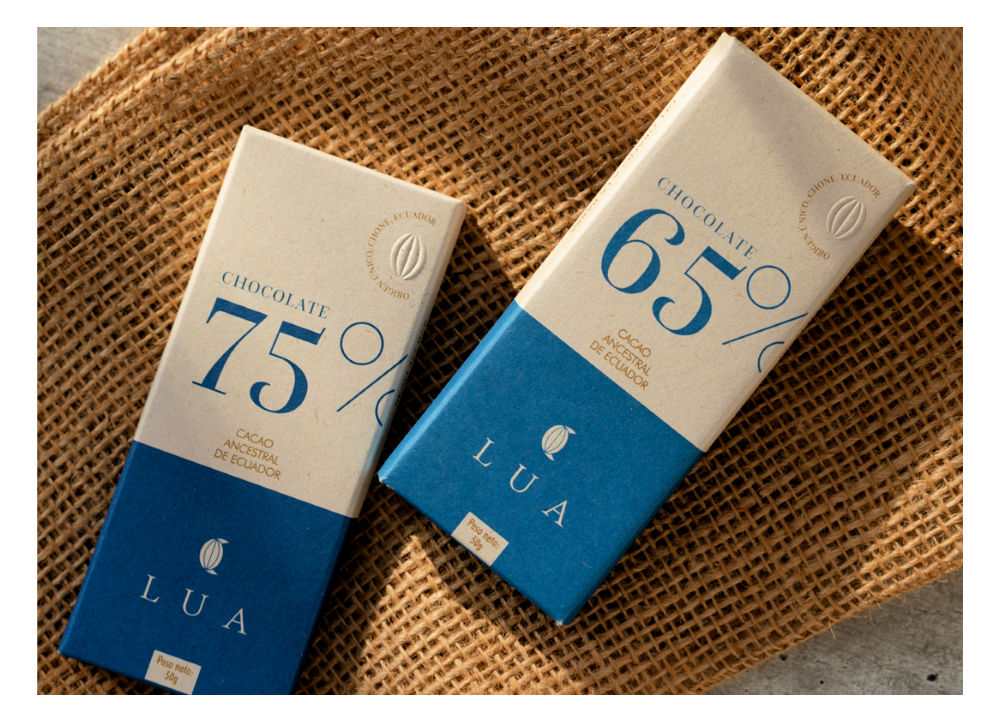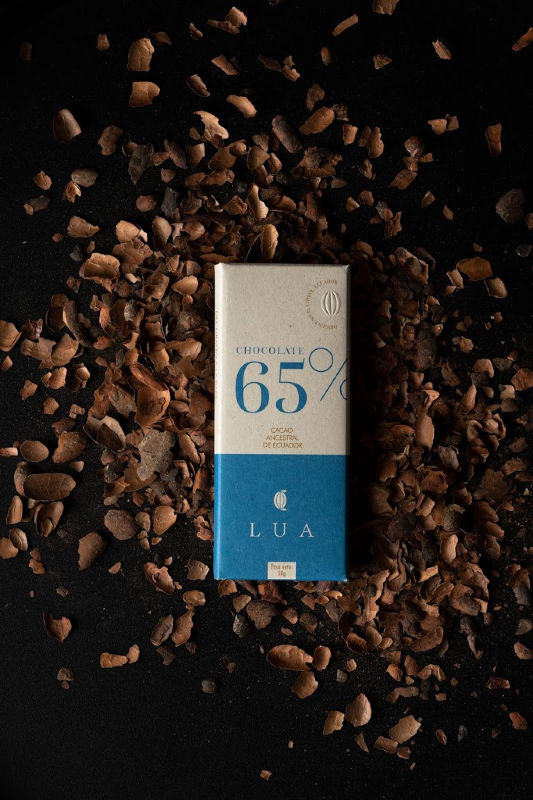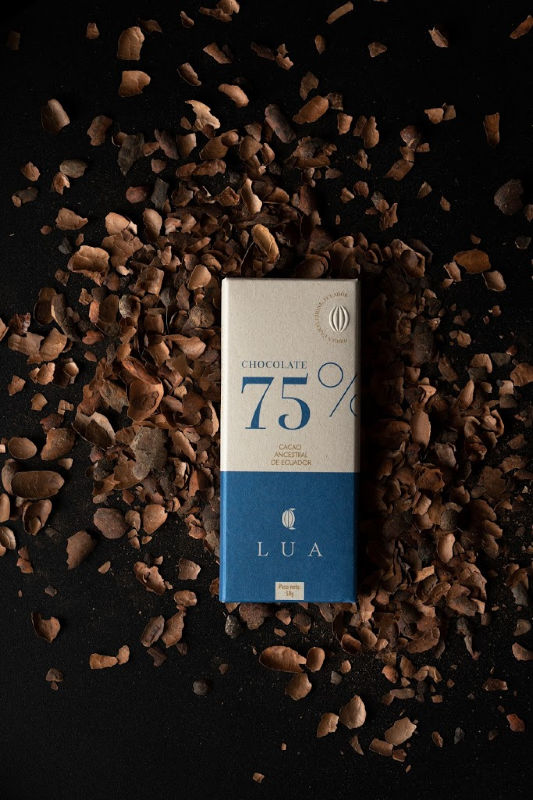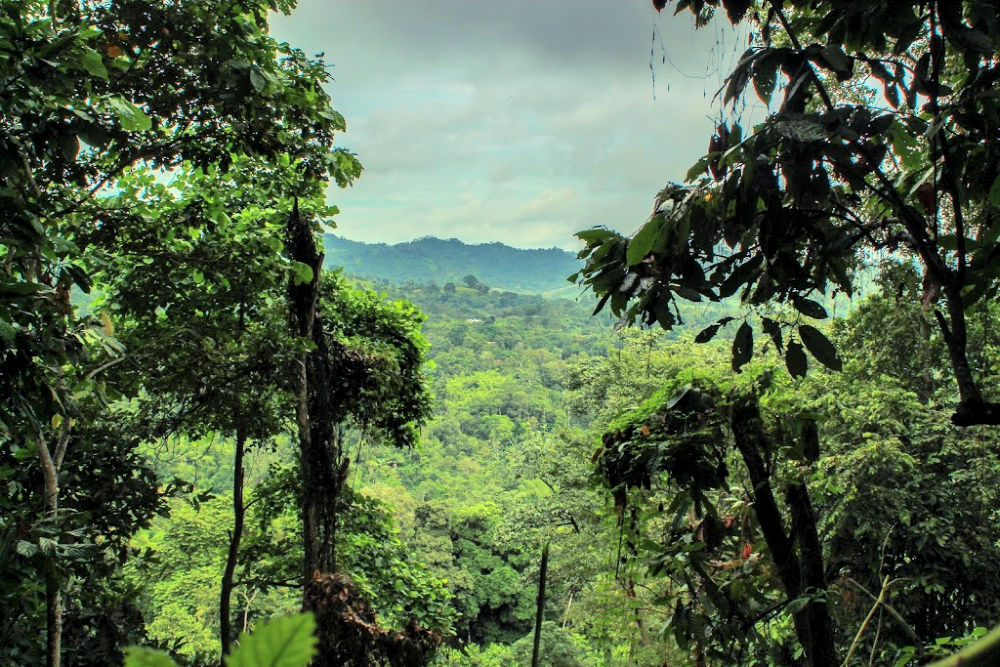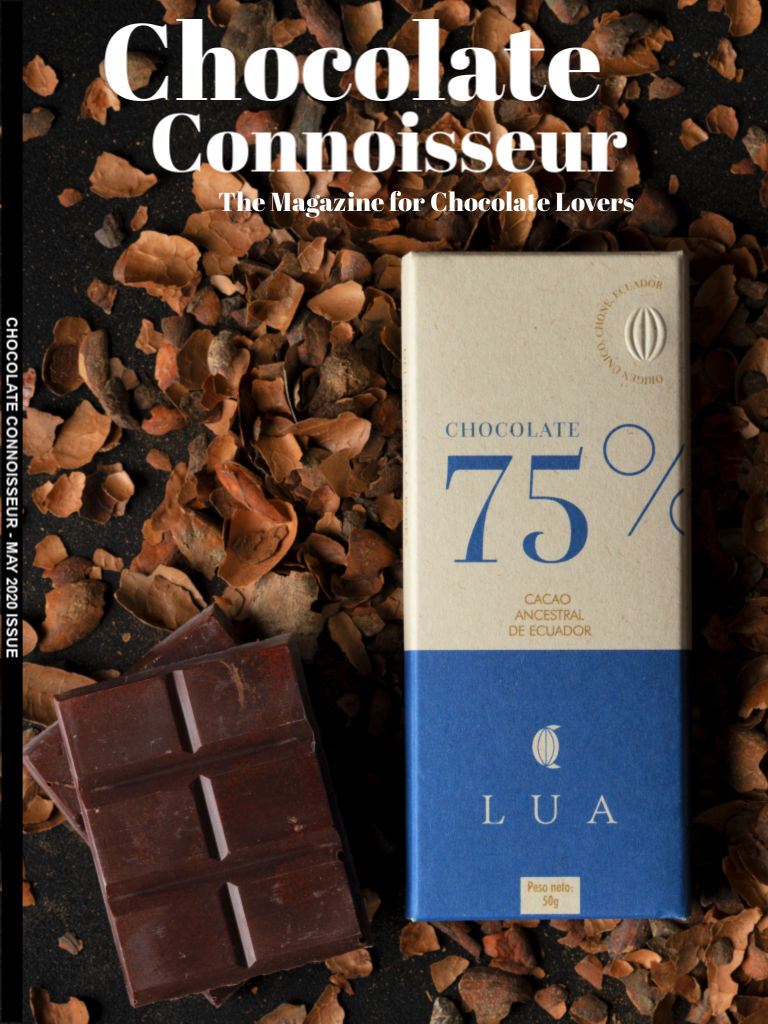In Focus: Lua Chocolate
by Fernanda Bravo
Moon, Magic and Nature
Ecuador’s gorgeous scenery will always take your breath away. Lovely valleys, amazing volcanoes, paradisiac beaches and the greenest jungles all paint its wonderful landscape. Provincia de Manabí, however, deserves special attention.
Within this province sits Chone, a small city famously known as “the Garden of beautiful women and brave men.” It’s a region covered in the most striking tropical forests, and its land births the most delightful cacao varieties.
Here, against this beautiful backdrop, the vision of Lua Chocolate first came to be, many decades ago.
Meet Christian Montesdeoca and Sebastian Gonzales, owners of today’s Lua Chocolate, an award-winning tree-to-bar company that farms their cacao according to the phases of the moon. Christian lives in Guayaquil, and Seba lives in Barcelona, but together they’ve created one incredible Ecuadorian chocolate project.
“Lua is the latin word for moon. It also means grace and gleam,” explains Sebastian.
“Our chocolate brims with it a very special charm, because we take care of our cocoa plants respecting nature and the lunar influence, following the tradition of our ancestors who were guided by the moon phases and the signs of the weather to treat their plants.”
The Origins of Lua
But the story of Lua dates back many decades ago, to when Próspero Zambrano Moreira owned the estate, Christian’s grandfather. At the time, the farm looked like any other.
It wasn’t. Christian thinks back on those days…
“I was born in Guayaquil but my family brought me up between Guayaquil and Chone. My mother was born at the Lua Estate. It had always belonged to my family. So, it was customary that we spent every holiday at the farm.”
The Province of Manabí offers some of the most luxurious cacao in the world, and Lua grows these genetically blessed varieties. Since anyone can remember, all its farmers carefully grew the cacao trees (and all the flora that lives there), according the phases of the moon, believing that the moon’s light and energy put a spell over the crops and influence the harvest season.
So much cacao… the Lua Estate
With pride and nostalgia, Christian reminisces how the memories carved at Lua are still some of his finest —
“I remember my days there; the aromas coming from my grandmother’s kitchen at her house when, she roasted some coffee and cacao beans from the Estate. I remember the delicious scents when she used to make Dulce de Pechiche (a traditional Ecuadorian dessert).
Back then, while walking through those ancient cacao trees, I never seriously thought I would end up working with chocolate, I was too young! I’d just enjoy the trips to the farm, especially when I went there with my grandfather, a self-made man, who was an arduous laborer and an outstanding father.”
As Christian remembers, Próspero Zambrano was a man of commitment, whose sharp determination allowed him to save a good amount of money, which he and his wife soon invested in small patches of this fruitful land in Chone.
With a piecemeal approach, Christian’s grandfather eventually owned a good portion of the Lua Estate.
“My grandmother raised all kinds of farm animals, while my grandfather had to work as a railway installer for the new train that was being built back then in the region, with the purpose of saving some money.
He was the oldest of his siblings, so he had a great responsibility in helping out his family. And so he did.”
One of Christian’s most important memories, which sealed his fate within the chocolate world, took place one fateful afternoon when he made a promise to himself that he would one day buy the estate —
“I remember, I was only 12, and we were having one of our beautiful afternoon conversations; I candidly told him that I would love to have a farm like Lua. I meant it. He just said in a cheeky way ‘But son, you can buy it from me!’
I smiled back. But in my mind, I promised myself I would. Some day.”
Christian grew up to become a successful software and computer engineer, and with his job came the constant traveling… the busy meetings… life in big cities… all circled by the buzz of business. Still, he never let go of his promise.
“My career,” says Christian, “was far from chocolate at the beginning.”
Learning What Real Chocolate Tastes Like
An abundance of heartwarming chocolate memories from his younger years at Lua, however, ensured that his path would most certainly change course at some point.
“When I was only 5 years old I used to love these two chocolate candies called Milkybar and Manicho (chocolate and peanuts). I was such a fan, and I usually saved every penny I had to finally be able to go to the little store close to my house to get some. Those two confections were my first approach to what at least I thought of chocolate.”
He soon discovered, however, that real chocolate is something very different.
“One day my mother told us that my grandmother made true chocolate, from the bean. I thought ‘how come?!’
I was disappointed to realize I would have to wait months before trying it, since the holidays were not even close, and we would need to wait for our next trip to Chone.
I imagined myself trying that handmade chocolate, with those beautiful cacaos I had seen at the farm, and patiently I waited. Then the time came… we were finally at Lua in Chone again.
One afternoon my grandmother went into the kitchen. She came back with this strange dark looking crumbly ball that had a strong aroma. She told me ‘This is real chocolate.’”
“I wasn’t very convinced by it then,” Christian laughs, “but my grandmother explained to me how it should be eaten.”
Christian laughs again —
“Honestly at first I did not like it that much! I was five and used to the sugary candies I’d previously known as chocolate. But then, when I felt the warmth of the milk and the aromas of the cacao develop together as I sipped from the cup, it tasted amazing.”
His true love for cacao began in earnest that fateful afternoon, and at a very young age, Christian fantasized about making chocolate. Some years later, he made the binding promise to his grandfather.
“I thought it was impossible” he notes, “but I still felt I wanted to do it.”
Lua Today, a Second Start
The Estate has grown cocoa trees from its very beginning. Many (if not the majority) of the trees that exist on the farm, are hundreds of years old, with the unique genetic profile that accounts for the cacao’s incredible flavor.
“It is a place of outstanding beauty. It has an extension of around 22 acres. It used to be way bigger. It even belonged to my great-grandparents. My mother was born there.”
Chone has its own river and tropical rainy weather that renders its lands very fertile, perfectly suitable for cacao farming. Around 150,000 people inhabit its beautiful landscapes.
Inspired by the beauty of this wondrous place, and with a strong resolve from his own memories and family legacy, Christian decided to buy the farm and start his own cacao business, straight from scratch.
“About 5 years ago I finally purchased the land from my uncles. I knew nothing about cacao or chocolate but I was resolute to learn about it.
Once I owned it, the farm kept producing, yielding… but I needed to make the most out of it. Not just in terms of income, you know? But because it is such a special place for me. I wanted it to thrive in every possible way.”
It wasn’t easy at the beginning of course, it never is. But help soon arrived…
The Three Chocolate Musketeers
Christian’s main purpose when buying the Estate was to preserve and honor his grandfather’s memory. Unfortunately, where the resolve existed, a clear business plan did not.
“It was really hard at the beginning. I was the owner, just like I had promised my grandfather I’d be. Yet, I didn’t know much about it. The cacao production was small, and the trees would not yield much.”
With this scarcity in the harvest, it soon grew difficult to even pay the laborers. Forced to quickly find a solution, Christian thought of a risky yet delicious way out.
“The only idea I had, it kept popping into my head. And it was to craft a chocolate from the Tree. From the beans of those very same cacaos my grandmother had made chocolate from, for me, many years ago. To honor them. And of course, this chocolate would be named Lua.”
Of course, to accomplish such a feat, he‘d need some clever partners to join him in the new chocolate adventure.
Luck was on his side.
“Two years ago, I met this smart Chilean named Sebastian, who had recently graduated from University with a Bachelor’s Degree in Business Administration. He had just applied for an internship at my software company.
I knew immediately he was the one I’d been looking for.
After working with him for a while, I presented him with my chocolate project and convinced him to work on the assessment of this new, and very different, business.”
Sebastian (Seba for short) had no idea what an epic twist his life would soon take.
He continued working for a while at Kuvasz Solutions (Christian’s Software Company) but before long, Christian asked Sebastian to be his business partner.
Sebastian didn’t hesitate.
In a very clever way, he crafted a business plan which would masterfully set the foundations of Lua as a fine chocolate maker. His very detailed and specific preparation, according to Christian, filled in all the missing pieces.
Indeed, he feels that, if Seba hadn’t intervened, Lua would not exist as it does today.
“I felt it was a completely new world for me, something very challenging,” adds Sebastian.
Lua still needed one final piece, however… a true launch strategy. Enter the third soon-to-be-member of the Lua family, Teresa Leonvendagar, with her Bachelor’s Degree in Business Administration and work experience as a Graphologist.
“Teresa has a very accurate commercial vision,” says Christian. “She helped us clear things up and gave the business some good structure, so we were able to finally feel sure enough in launching it.”
Teresa and Christian knew each other well before the Lua partnership, so partnering for Lua went very smoothly.
“I firmly believe that when it comes to business, the building of solid relationships and talent, while also creating a spirit of community, are what matter the most,” explains Teresa.
Christian hired her as CEO of Lua in 2019.
With the Lua Chocolate family now complete, the real adventure was just about to begin…
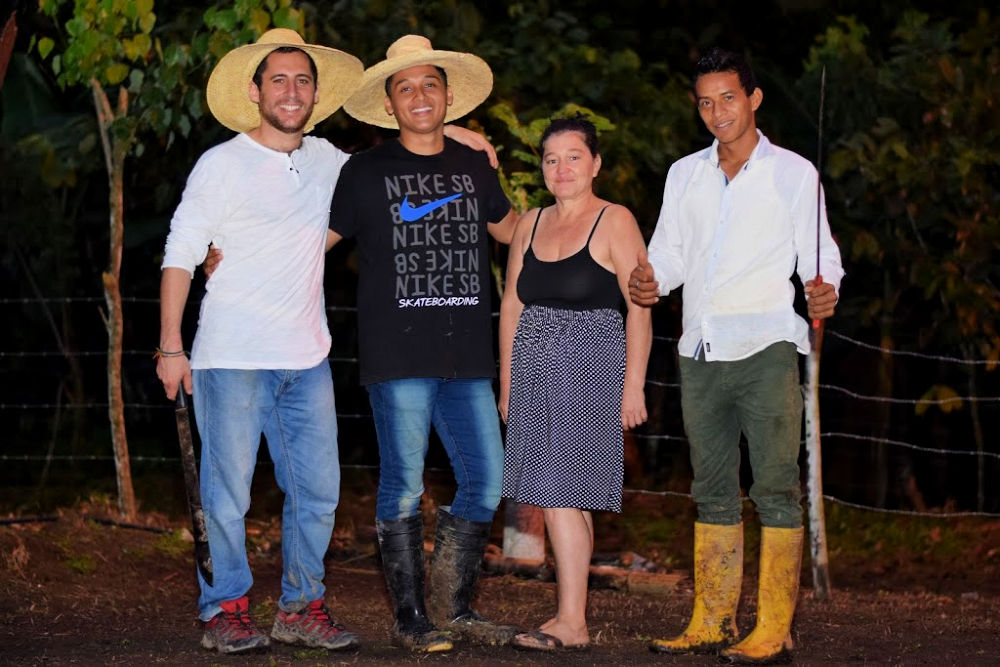
Left to right – Sebastian and Stewart with Tonita and Fernando (inkeepers of the estate)
3-2-1… Launch!
The three commercial partners had a lot of experience….in business that is. Christian readily admits the road to success wasn’t easy, since none of them really had any idea on how to actually make chocolate!
“We didn’t know where to start, or where to get any recipes from. But providentially, as we moved through, we kept meeting people who were willing to help us in our new journey.”
They had to wait for a while though… for machines to arrive, for paperwork to be cleared up. While they waited for months that seemed eternal, they also honed Seba’s business plan, and the farm supervisor spent the time preparing for production, everything from procuring the right fermentation tools and boxes to smoothing over all the logistical challenges. As Christian notes —
“José Luis, the manager, arranged every detail to ensure a high-quality cacao processing. We wanted to get the most and best out of our exceptional trees and planned accordingly.”
Christian shows no hesitation when he speaks of Jose’s strength of character —
“He owns a sharp willpower that allows him to quickly learn and do the right thing. He is an expert in harvesting, in fermenting and drying. And he is currently under a training program that teaches the treatment of ancient cacao varieties.”
Still, as most everything fell into place, the big three weren’t really prepared in the culinary sense. Lua could count on an accomplished MasterChef, who Christian recognizes as a pivotal element of his chocolate’s success:
Stewart Zambrano is the magician of Lua. He is the Master Chocolatier and holds such a passion for his job. I have the confidence to say he dreams of chocolate almost every night.
Seba actually met Stewart in Chone, where Stewart recently finished honing his chocolate skills via some very demanding training, surrounded by Japanese delegations who expected only the crème de la crème.
Since Seba and Christian were looking for help, they gave Stewart, nineteen years old at the time, a shot at crafting chocolate. Stewart’s first sample bar tasted incredible, so Christian then gave him an official interview, which impressed Christian just as much as the chocolate.
“Stewart’s passion for chocolate is the equivalent to my passion for the Estate, Christian notes. “And for me, that combined passion is what makes our chocolate so unique.”
Christian’s wife Verónica also played an important role in Lua’s plan.
“My wife has always been an amazing partner. She was for a long time, Country Manager of a large hotel chain. When we started Lua, she got some bean to bar training at Escuela de Negocios de Cacao y Chocolate Jaime Freire. She’s always seeking to make things better.”
Verónica and Christian at the 2019 Ecuadorian Chocolate Awards
Today, Verónica manages Lua’s factory in Ecuador.
“It is in the end the strength and values of my little team that earned Lua the Gold Prize at The Ecuadorian Chocolate Awards in 2019.”
Lua had just launched, and within a matter of weeks, twenty-three professional chocolate tasters crowned Lua as the best chocolate of the competition, above other highly-reputable, well-respected brands.
Now that’s a great beginning!
Chocolate with A Soul
When asked about the uniqueness of Lua Chocolate; Christian, Teresa and Seba all agree on one thing: they’ve all dedicated their minds and hearts to the whole process.
“Because Lua is Tree to Bar, we monitor all stages of the process, from the very beginning… from the seed. That’s what sets Lua apart from other chocolate makers.”
It’s quite a job. The trees are well taken care of from the moment they are first planted.
“They are watched as if they were our children,” adds Christian.
He continues —
“We think we are fortunate to be a part of every phase of our production. It is something that only few enjoy. We get to treat our beautiful trees with the most love and care. That’s the reason they are fruitful and offer delicious cacao!”
The cacao trees at Lua are huge, more than one hundred years old, and thanks to Lua’s unique microclimate and soil, the quality of cacao they produce is impeccable. The trees yield during winter and summer.
Despite producing with great frequency, these enormous trees yield only a small amount of fruit. A little goes a long way, however, thanks to the quality cacao profile.
Christian elaborates —
“The pods offer a distinctive flavor and aroma with a reminiscence of all the fruits grown at the Estate. Banana, papaya, mango, orange… it’s as if the spirit of the Estate exists in each pod.
Everything that my grandfather carefully grew there a long time ago lives in the flavor of these cacao fruits today.”
Forging Ahead
With Lua now established and on the rise, the “three chocolate musketeers” agree on the fact that once you enter the craft chocolate movement, it’s difficult to leave.
As Christian notes —
“Connecting with nature, with the estate and the people that work there, comes with the territory. You feel rewarded.”
Sebastian adds —
“We love that it’s something we created from the seed. From scratch. There is so much of us in every single bar. The fact that we are able to create, to transform a seed into a 65% or 75% bar, blows my mind.”
And finally, Teresa also says –
“There is always something new, something to be improved. At Lua we want to involve everyone. From our farmers to our customers. Create a community. We think it is important that people learn where their chocolate is coming from.”
With a focus on perseverance and hard work, they continue to perfect what they started , and the team “falls in love with chocolate every day.”
Ethics and Relationships
The trio elaborates on how passionate they are about the beautiful project behind these luxurious bars. Sebastian and Christian have trained and shared with the Farmers at Chone, and they could not be more grateful for working with people that take care of the Estate in such a loving and dedicated way.
Christian adds —
“We love our people, our farmers. We have an excellent relationship with them. We have built our bond on mutual trust and love for nature. I respect them very much and I know without them, Lua would not exist.
Sustainability is one of Lua’s pillars. Their major concern, when the business started, was the respect everyone in the chain deserves. They ensure laborers are paid fairly, and that all of the vacant positions are filled with local workers.”
And Sebastian notes –
“As an artisanal Tree to Bar chocolate company, we don’t want to just profit at any cost. It is not our intention to sell the cheapest chocolate. We are proud to say we can make the best quality chocolate, in partnership with all the local people involved in the process.”
Indeed, Seba spent several months at the Lua Estate, fostering a bond with the farmers and the people who help them in achieving their goals. He remembers his time there with a smile:
“My first day I was steady and ready to go on a cocoa adventure… to get to know the farm and the surroundings. There I was, walking firmly and steadily with a machete in my hand.”
Seba elaborates, “I had not even marched 30 meters when I was suddenly faced with a huge snake! I thought it was better to leave and try and come back next day,” he laughs.
Lua puts an intense focus on farmer well being. They even built a beautiful house for the innkeepers. It’s all a part of their chocolate philosophy, that the key to creating an outstanding chocolate is to take care of all the people, and nature, in every given way.
Tasting The Bars
Lua harvests the fruits and ferments the beans according to a strict protocol created for this exclusive variety of cocoa. Their rigorous procedure gives rise to a high-quality end product, with very specific tastes and aromas.
In addition to the environmental influence on the beans, Lua’s careful conching process contributes as well. They conch all their cacao beans for an amazing 120 hours!
Of course, that all means very little if the rest of the ingredients in Lua’s chocolate don’t meet the same standards as the cacao itself. Christian quickly puts any such doubts to rest —
“We wanted to make the purest chocolate. Accordingly, we use as few ingredients as possible. Only cocoa beans – which are organic – and cane sugar. That’s it.”
Lua has a small range of products. They focus mainly on quality versus variety, offering nibs, cocoa powder of the highest quality, and their star products: A 65% bar and a 75% bar (the bar that scored Gold during the 2019 Ecuador Chocolate Awards).
I planned out my tasting session for a fasted morning.
Looking at the beautiful packaging alone creates great anticipation, and I carefully open the little boxes containing each bar… dutifully wrapped in silk paper and then sealed with a tasteful band.
I start with the 65% bar.
A very glossy chocolate surface greets the eyes when you first open the bar, which shows off a hazel color with reddish hues… and I immediately smell notes of flowers and ripe fruit. Putting a piece in my mouth, it slowly melts away, revealing zesty and flowery notes.
There is a pleasant acidic hint, and although the piece disappears from my mouth, the flavor yet lingers for a while. There is no bitterness, ever… only a happy, bright tinge.
Enthusiastically I clear the tannins from my palate using some polenta and then, sensing what’s coming, I move on to the award-winning 75% bar.
It’s as glossy as the first one, and maybe the color is a bit more reddish. A strong nose of flowers and herbs surprises me. I put a piece in my mouth and the creaminess is undeniable.
An explosion of flowers and an acetic tone are the dominating notes in this one. A long aftertaste and a sexy bitterness remain for a while in my mouth. I understand instantly why this bar won Gold.
Needless to say, I adored and devoured both bars! Anyone fond of the Ecuadorian cacao profile will cherish these two impeccable chocolate bars.
On the Lua Horizon
Sure, they’ve already met with great success, but truth be told, Lua is still in its developing stages. Christian, Sebastian, and Teresa all see much exploration ahead and are excited for the future.
“For now, we remain focused on creating our two signature bars, cocoa nibs, and cocoa powder,” Christian enthusiastically notes, “but with our master chocolatier and the team, we are testing some recipes for other varieties.”
He then adds —
“We plan on launching a few new products, hopefully soon. We’ve already created a bar sweetened with coconut sugar that has a very special profile, and we intend to create and produce bars with a wider range of cacao percentage as well.”
They understand the basic tasting premise that each palate is unique. It makes sense then that they are looking forward to expanding their assortment of products.
“Our 75% bar will always be our little jewel. We are so proud of it, of the effort all the team put behind its creation. To win la Gran Barra Dorada last year was such a reward! It was an undisputed first place.
And it is encouraging. We want to reach more people. We want our community to have the opportunity to go in a journey with our chocolate. That is the reason we want to grow our variety.”
In the meantime, as the Master Chocolatier makes the magic happen, the team stays busy joining several chocolate events and learning more about the trade, although obviously this took a hit recently with the coronavirus pandemic.
Still, before the pandemic took effect, Sebastian made quite the rounds —
“Since I arrived in Barcelona, I‘ve been attending different cacao and gourmet events, here in Europe. I have learned quite a lot at them and made a lot of networking.”
These include Salon du Chocolat Paris, Salon du Chocolat Brussels, and even the first version of the Basquetxoc Festival in Balmaseda, País Vasco.
“I’ve had the chance to try excellent chocolates at each festival. But that is not what I consider the most important thing right now … I believe during my trips to these events, I have been lucky to meet and make great friends around the world.
We, the Bean to Bar or Tree to Bar crafters, should work together, hand in hand, to be able to galvanize this industry, which has so much to show to the world.”
The team is currently focused on entering the chocolate markets in both Spain and Germany, two countries with a deep appreciation for fine chocolate.
They also hope to be selling Lua Chocolate on five different continents within the next eighteen months or so.
Christian notes —
“We spend 50% of our time dreaming and 50% of it making it happen. From day one we said: in the time of a year Lua will earn an important award.
And it happened. This is how we stay focused.
I like to think that chocolate was always an essential part of us. All the incentives we get from customers who keep choosing Lua is a reason for us to believe we are on the right path.”
I completely agree with that assertion, and we all anxiously await the delightful surprises Lua most certainly has in store for the craft chocolate world.
Click here to visit the Lua Chocolate website.
And click the links below to connect with them on social media.
+ PHOTOS BY LUA CHOCOLATE
(unless otherwise noted)

